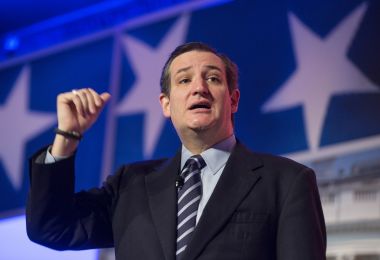Ted Cruz appeals to evangelicals in campaign launch – but they may not be enough to get him elected

US presidential hopeful Senator Ted Cruz made a pitch for the evangelical vote in his campaign launch at Liberty University, Virginia yesterday.
During his speech he said: "Today, roughly half of born-again Christians aren't voting. They're staying home."
He continued: "Imagine instead millions of people of faith all across America coming out to the polls and voting our values."
The Texas Republican, who is known for his opposition to President Obama's rapprochement with Cuba and negotiations with Iran as well as his hard-line opposition to the view that human beings are causing climate change, chose the largest evangelical university in the US to announce his candidacy. Students were required to attend his speech, which was peppered with references to America as a "shining city set on a hill".
"For so many Americans, the promise of America seems so distant," he said. "So many fear it is slipping away from our hands."
He spoke to a highly conservative agenda, with calls for a flat tax, the abolition of the Internal Revenue Service, securing the border with Mexico, upholding the "sanctity of human life" – code for opposition to easy abortion – and protecting gun rights.
He also stressed his own Christian faith, saying: "There are people who wonder if faith is real. I can tell you, in my family there's not a second of doubt, because were it not for the transformative love of Jesus Christ, I would not have been saved and I would have been raised by a single mom without my father in the household."
In his public pronouncements Cruz has made a particular issue of religious liberty, commenting on issues such as same-sex marriage. Russell Moore, president of the Southern Baptist Ethics and Religious Liberty Commission, told The Guardian: "In the past several election cycles, I don't think religious liberty has even been asked about in the primary or general election debates. But this year, it is a major focus for evangelicals as well as for Roman Catholics." High-profile cases such as that of Barronelle Stutzman, the Christian florist who refused to provide flowers for a gay wedding, are likely to be used as rallying-cries among conservative evangelical voters.
While his audience applauded his sentiments, Cruz may face competition for evangelical votes from other candidates yet to declare in what may be a large field. Among them is Baptist minister Mike Huckabee, who has run before and is also likely to do well among this constituency.
Furthermore, while Liberty University – founded by Moral Majority leader Jerry Falwell – has influence, as a fundamentalist institution it is not typical of US evangelicals generally.
It is also questionable whether evangelicals are as politically apathetic as Cruz implies; in Florida in 2012, no less than 86 per cent of them turned out to vote, mainly for Mitt Romney; however, President Obama still carried the state. Polls from the 2012 election showed a record 21-78 per cent split among white evangelicals in favour of the Republican candidate. However, Obama was far more successful at connecting with ethnic minority voters and young people.











